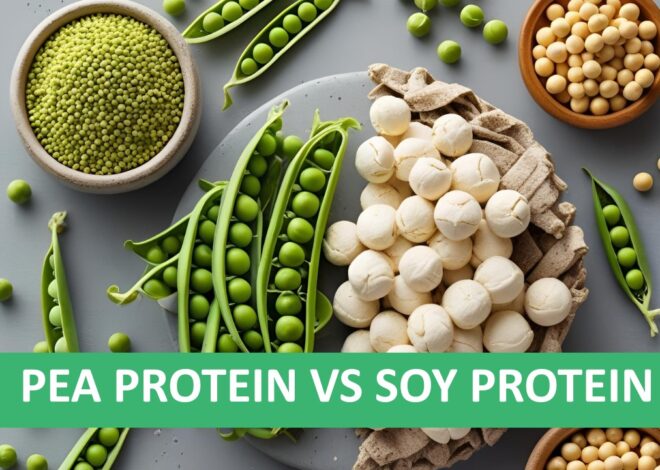
Whey Isolate or Concentrate? Unlock the Secret to Your Goals
Protein powders, drinks, and bars have become incredibly popular dietary supplements. Among the most sought-after types is whey, derived from dairy. It offers isolate and concentrate options, catering to different needs. Both forms provide unique benefits, but choosing the right one depends on personal goals. As someone who has used these supplements, I’ve seen how whey isolate, with its higher protein content, supports lean muscle growth. Meanwhile, whey concentrate offers a balanced option with additional nutrients. These common differences make each suitable for specific fitness journeys. Deciding which is better for you depends on your lifestyle and goals, whether it’s muscle gain, recovery, or overall health improvement.
Isolate or Concentrate? Discover the Superior Whey Protein
Whey protein isolate and whey protein concentrate are two widely-used protein supplements derived from milk. While both are excellent sources of protein, their distinct differences can impact your choice. As someone who’s explored this world, I’ve learned how understanding isolate and concentrate helps make better decisions.
Your fitness goals, dietary needs, and budget play key roles in selecting the right option. Isolate offers higher protein content with fewer carbs and fats, ideal for lean muscle gain. Concentrate, meanwhile, provides a nutrient-rich alternative. By considering these key differences, you can choose a supplement that’s tailored to your goals and make an informed decision to enhance your results.

Whey Protein Isolate vs. Concentrate
Whey protein is a popular dairy-based supplement derived from milk during the cheesemaking process, containing all nine essential amino acids. While both whey protein isolate and whey protein concentrate are common forms of protein powder, they differ in filtration, lactose, and protein content.
“Whey protein isolate undergoes fine filtration, resulting in a higher protein content (at least 90%) with minimal lactose, fat, and calories. This makes it ideal for those with lactose intolerance or aiming for fat loss while preserving muscles. “
“On the other hand, concentrate is a nutrient-rich option with slightly more fat and carbohydrates. Choosing the right one depends on your fitness goals and dietary preferences”
Learning the fundamentals of Whey Protein:
Whey Protein:
Whey protein is an incredibly popular choice among fitness enthusiasts, thanks to its dairy-based origin and high nutritional value. It is derived during the cheesemaking process when milk separates into curds and a liquid portion known as whey. This nutrient-rich liquid, often seen in a container of yogurt, is further filtered and dried to create whey protein powder, a convenient and versatile supplement. What makes whey so beneficial is that it’s a complete protein, containing all nine essential amino acids your body needs for muscle repair and growth. Whether you’re looking to recover after workouts or simply improve your daily protein intake, whey protein offers an excellent solution. Its powder form makes it easy to mix into shakes or recipes, ensuring you get the nutrients your body requires to perform and recover.

Types of Whey Protein:
It has further three types:
- Concentrate (WPC)
- Isolate (WPI)
- Hydrolysate (WPH)
Concentrate
Concentrate is common in protein shakes, bars, and infant formula, containing varying amounts of lactose, fat, and protein, depending on its intended use.
Isolate
Isolate undergoes further processing to reduce fat and lactose content, resulting in a product with mainly protein.
Hydrolysate
Hydrolysate, where protein chains are broken down, is easier to digest and often used in infant formulas for sensitive stomachs. Each form serves specific nutritional and dietary needs.
Making of Whey & Whey Isolate:
Whey is a group of eight proteins found in cow’s milk:
- Beta-lactoglobulin
- Alpha-lactalbumin
- Glycomacropeptide
- Immunoglobulins
- Lactoferrin
- Bovine serum albumin
- Lactoperoxidase
- Lysozyme
These proteins are a natural byproduct of the cheese-making process.In the cheese-making process:
- Enzymes are used to curdle cow’s milk.
- Solid curds are separated to make cheese, leaving liquid whey.
The liquid whey:
- Is pasteurized to eliminate bacteria.
- Is dried into whey powder, which serves as a versatile source of nutrition.
Whey Isolate & Whey Concentrate:
Whey Protein Isolate:
The Whey protein isolate is a highly filtered form of whey protein, offering superior benefits. Through fine filtration, it becomes almost entirely free from lactose, containing less than 1%. This virtually lactose-free content makes it ideal for those with acute lactose intolerance or anyone aiming to maintain muscles while reducing fat. Whey protein isolate has less fat, cholesterol, carbohydrates, and calories compared to whey protein concentrate, while delivering a higher protein content, typically at 90% or more. It’s a great option for muscle maintenance and fat loss goals, providing concentrated nutrition in every serving.
Benefits of Whey Protein Isolate:
- Higher Protein Content:
Whey isolate contains 90% or more protein per serving, providing a concentrated source of protein for those looking to increase their intake while minimizing calorie consumption. - Low in Lactose:
With almost no lactose, whey isolate is a great option for individuals who are lactose intolerant or sensitive to dairy. - Quick Absorption:
Its refined nature allows for rapid absorption, which helps with muscle repair and recovery after workouts. - Low in Carbs and Fats:
Whey isolate contains minimal carbohydrates and fats, making it an ideal choice for those following low-carb or ketogenic diets.

Whey protein concentrate:
Whey protein concentrate is a common form of whey protein, known for its biologically active components and beneficial properties. Packed with the good stuff from whole milk, it has a higher percentage of lactose compared to whey protein isolate, yet remains relatively low in fats and carbohydrates. With 70-80% protein content, whey protein concentrate is rich in BCAA’s, branched chain amino acids, and glutamine. This makes it a fantastic choice for those aiming to build or maintain muscles and recover after workouts. It’s a dependable, versatile option for fitness enthusiasts and athletes alike.
Benefits of Whey Protein Concentrate:
- Balanced Nutrition:
Whey concentrate offers a well-rounded profile of protein, fats, and carbohydrates, making it a great choice for those who don’t have strict macronutrient requirements. - Cost-Effective:
Generally more affordable than whey isolate, concentrate provides a budget-friendly way to boost protein intake without breaking the bank. - Richer Taste:
With its natural dairy flavor and creamier texture, whey concentrate tends to taste better, especially when mixed with water or milk. - Supports Overall Health:
The added fats and carbohydrates in concentrate provide essential nutrients, including immune-boosting components like immunoglobulins, which contribute to overall health.

Major Difference between Whey Isolate & Whey concentrate:
| Aspect | Whey Isolate | Whey Concentrate |
|---|---|---|
| Processing | More | Less |
| Protein Content | 23 grams | 18 grams |
| Carbohydrates | 1 gram | 3.5 grams |
| Fat | 0 grams | 1.5 grams |
| Lactose | Up to 1 gram | Up to 3.5 grams |
| Cost | Higher | Lower |
Key Differences:
Protein Content and Purity:
- Whey concentrate: 70-80% protein by weight.
- Whey isolate: 90% or more protein by weight.
Lactose and Fat Content:
- Whey concentrate contains more lactose and fat.
- Whey isolate has lower lactose and fat content, making it suitable for those who are lactose intolerant or on a low-carb diet.
Calories:
- Whey concentrate has more calories per serving due to higher fat and carbohydrate content.
- Whey isolate has fewer calories per serving.
Cost:
- Whey concentrate is generally cheaper than whey isolate due to less processing.
Taste and Texture:
- Whey concentrate has a creamier taste and texture.
- Whey isolate has a lighter texture and may lack some of the richer flavors.
Digestion and Absorption:
- Whey isolate is easier to digest and quickly absorbed by the body, making it ideal for post-workout recovery.
- Whey concentrate may be slightly slower to digest due to its fat and carbohydrate content.
How to Choose Between Whey Isolate and Concentrate
Consider Your Fitness Goals:
When deciding between whey isolate and concentrate, it’s important to consider your fitness goals. If your primary goal is to build muscle while keeping calories and fats low, whey isolate is the superior choice. However, if you prefer a balanced protein supplement that’s more economical, whey protein concentrate is a great option.

Dietary restrictions
For those with dietary restrictions, such as being lactose intolerant or following a strict low-carb diet, whey isolate is better suited to meet your needs due to its reduced lactose and carbohydrate content.
Budget Constraints:
If you’re on a tight budget, whey protein concentrate is a cost-effective solution, offering great protein intake without compromising quality.
Digestive discomfort
However, if you experience digestive discomfort due to the lactose content in concentrate, switching to whey isolate can help resolve those issues.

Taste Preferences
For those with taste preferences, whey concentrate is known for its creamier taste, making it more enjoyable in shakes and recipes. If flavor is your priority, consider trying different brands and flavors to find the one that suits you best.
Potential Risks of Whey and Concentrate Isolate :
Whey isolate and whey concentrate have some of same downsides, although there are subtle differences:
Calories:
Both whey isolate and whey concentrate share some downsides, but with subtle differences. If you’re trying to lose weight, keep in mind the calories and nutrition in these products, especially since whey concentrate tends to have more fat, carbohydrates, and calories.
Added sugar and processed ingredients.
Be cautious about added sugar and processed ingredients, as many whey products contain these to improve taste. Look for options with fewer artificial flavors and consult nutrition experts on minimizing processed food.
Regulation
Additionally, protein supplements are not regulated by the FDA for safety or effectiveness, so always choose products that are NSF Certified for Sport or Certified by Informed Choice, as they’ve been independently tested and verified for purity.
Digestion
When it comes to digestion, if you have lactose intolerance, whey isolate is the better choice. The lactose and sugars are largely removed during processing. However, if you suffer from a dairy allergy, both whey and whey isolate may upset your stomach, and in that case, you should consider plant-based protein alternatives.
Cost
As for cost, whey isolate tends to be more expensive than whey concentrate because manufacturers take extra steps to reduce fat and lactose content.
Nutritional deficiencies:
Whey protein is designed as a supplement to support your diet. However, experts suggest that it’s best to get your protein from whole foods like nuts, seeds, low-fat dairy (such as yogurt, cheese, and milk), beans, lentils, fish, poultry, eggs, and lean meat. Always consult your doctor before introducing any new dietary supplements, especially if you have any health conditions or diet restrictions. Your doctor can guide you in making an informed decision about what’s best for your health.
Whey Protein Isolate vs. Whey: Which Is Better?
Both whey protein isolate and whey protein concentrate offer similar benefits, and there isn’t much evidence to suggest that one is significantly better than the other. The best choice for you depends on individual factors, such as:
| Factor | Whey Protein Isolate | Whey Protein Concentrate |
|---|---|---|
| Lactose Intolerance | Better for those who have trouble digesting lactose | May cause issues for those with lactose sensitivity |
| Calories | Lower in calories, carbohydrates, and fat, making it ideal for weight loss | Higher in calories, carbs, and fat, but can be suitable for general use |
| Taste | Lighter taste, may be less creamy | Richer, creamier taste due to higher fat content |
| Cost | More expensive | More budget-friendly |
Ultimately, the choice between whey isolate and concentrate depends on your specific needs, preferences, and budget.
FAQs (Frequently Asked Questions):
What works better, whey or whey isolate?
Both whey protein and whey isolate provide the same benefits. The best option depends on individual needs such as lactose tolerance, calorie count, or budget.
Who should avoid whey protein?
If you have a milk allergy, you should avoid whey protein products as they are derived from cow’s milk and a byproduct of the cheese-making process.
Does whey protein promote weight loss?
Some studies suggest that whey protein can help reduce fat mass. Whey concentrate may be more effective than whey isolate for fat reduction.
Can whey protein help increase stamina?
Whey protein may help with faster recovery after exercise, which could lead to increased stamina over time.
What are the potential risks of whey protein?
Since whey protein is a dietary supplement, it isn’t regulated by the FDA for safety or effectiveness, so it may contain impurities. Be mindful of the calories listed on the label, especially if you’re trying to lose weight. Most people already consume enough protein, so supplementation may not be necessary. Additionally, since whey protein is processed, experts recommend prioritizing whole foods in your diet.
Which is better for lactose intolerance, whey isolate or concentrate?
Whey isolate has less lactose, making it a better option for those who are lactose intolerant. However, if you have a milk allergy, it’s best to avoid all whey protein products.
Conclusion:
Whey protein is a fast-digesting protein commonly found in dietary supplements. The two primary forms are whey isolate and whey concentrate. Whey isolate undergoes more processing, resulting in higher protein content with lower carbs, fat, and lactose. This makes it ideal for those managing their lactose intake or aiming to reduce fat and carbs, although it’s usually more expensive. In contrast, whey concentrate offers similar protein content at a lower cost, making it a more affordable option for those with less restrictive dietary needs. Both forms support muscle growth, recovery, and overall health, and both are high-quality proteins that contribute to meeting your daily protein intake goals. Whey concentrate is also beneficial if you’re seeking to gain mass without added weight. However, when choosing between the two, consider factors like taste, budget, and your specific fitness goals and lifestyle preferences








